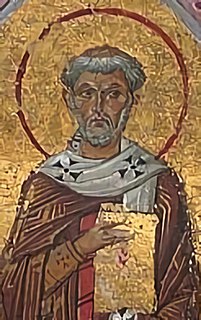A Quote by Thomas Aquinas
The apostles and their successors are God's vicars in governing the Church which is built on faith and the sacraments of faith. Wherefore, just as they may not institute another Church, so neither may they deliver another faith, nor institute other sacraments.
Related Quotes
The church exists primarily for two closely correlated purposes: to worship God and to work for his kingdom in the world ... The church also exists for a third purpose, which serves the other two: to encourage one another, to build one another up in faith, to pray with and for one another, to learn from one another and teach one another, and to set one another examples to follow, challenges to take up, and urgent tasks to perform. This is all part of what is known loosely as fellowship.
One can understand nothing of Christ without the mystery of the Trinity, nothing of the Church without faith in the divinity and humanity of Christ, nothing of the sacraments without the bridal mystery between Christian life without Christian faith. Thus, the present sermons revolve around the same center--the inexhaustible mystery of the one indivisible faith.
Faith is not our saviour. It was not faith that was born at Bethlehem and died on Golgotha for us. It was not faith that loved us, and gave itself for us; that bore our sins in its own body on the tree; that died and rose again for our sins. Faith is one thing, the Saviour is another. Faith is one thing, and the cross is another. Let us not confound them, nor ascribe to a poor, imperfect act of man, that which belongs exclusively to the Son of the Living God.
Just as in a physical body the operation of one member contributes to the good of the whole body, so it is in a spiritual body such as the Church. And since all the faithful are one body, the good of one member is communicated to another; everyone members, as the Apostle says, of one another [Eph 4:25]. For that reason, among the points of faith handed down by the Apostles, is that there is a community of goods in the Church, and this is expressed in the words Communion of Saints.
A nominal Christian often discovers in suffering that his faith has been in his church, denomination, or family tradition, but not Christ. As he faces evil and suffering, he may lose his faith. But that’s actually a good thing. I have sympathy for people who lose their faith, but any faith lost in suffering wasn’t a faith worth keeping.
Sometimes the sight of someone in one faith wrestling with that faith can empower you to wrestle with another faith. For me, it was reading about how the Catholic Church wrestled with itself in the 1960s. Pope John XXIII set Nostra Aetate - the Declaration on the Relation of the Church with Non-Christian Religions - in motion. It changed the relationship between Jews and Catholics. Today, Jews and Catholics meet as friends. If you can do that, after the longest history of hatred the world has known, that empowers you as a Jew or a Muslim to wrestle with your faith.
The best definition I can find of faith is the dependence upon the veracity of another. The Bible definition in the 11th chapter of Hebrews is, 'Faith is the substance of things hoped for, the evidence of things not seen.' In other words, faith says amen to everything that God says. Faith takes God without any ifs, If God says it, Faith says I believe it; Faith says amen to it.
One faith, St. Paul writes (Eph. 4:5). Hold most firmly that our faith is identical with that of the ancients. Deny this, and you dissolve the unity of the Church ... We must hold this for certain, namely: that the faith of the people at the present day is one with the faith of the people in past centuries. Were this not true, then we would be in a different church than they were in and, literally, the Church would not be One.
Thoughtful men, with hearts craving the truth, have come to seek in the Catholic Church the road which leads with surety to eternal life. They have understood that they could not cleave to Jesus Christ as the Head of the Church if they did not belong to the Body of Jesus Christ which is the Church. Nor could they ever hope to possess in all its purity the faith of Jesus Christ if they were to reject its legitimate teaching authority entrusted to Peter and his successors.




































